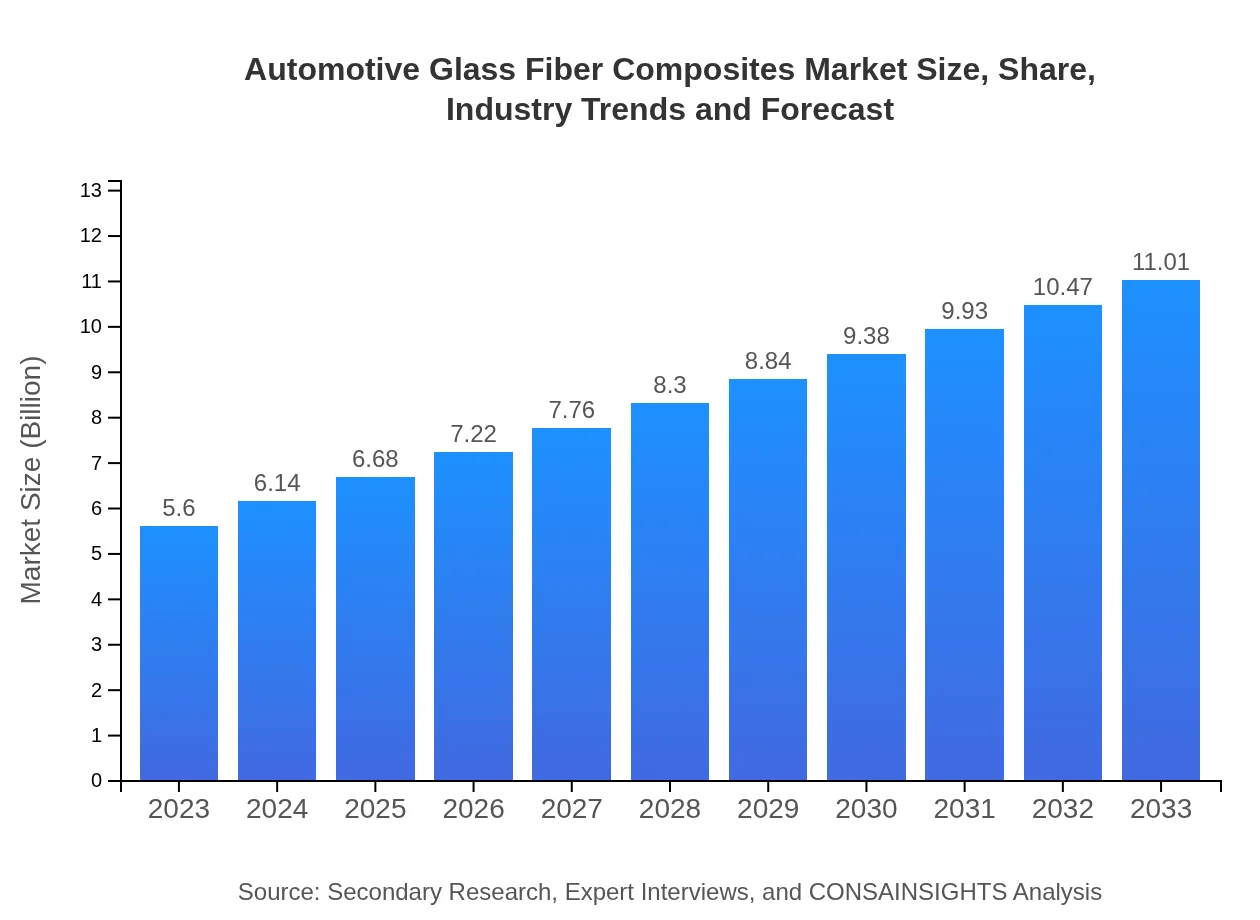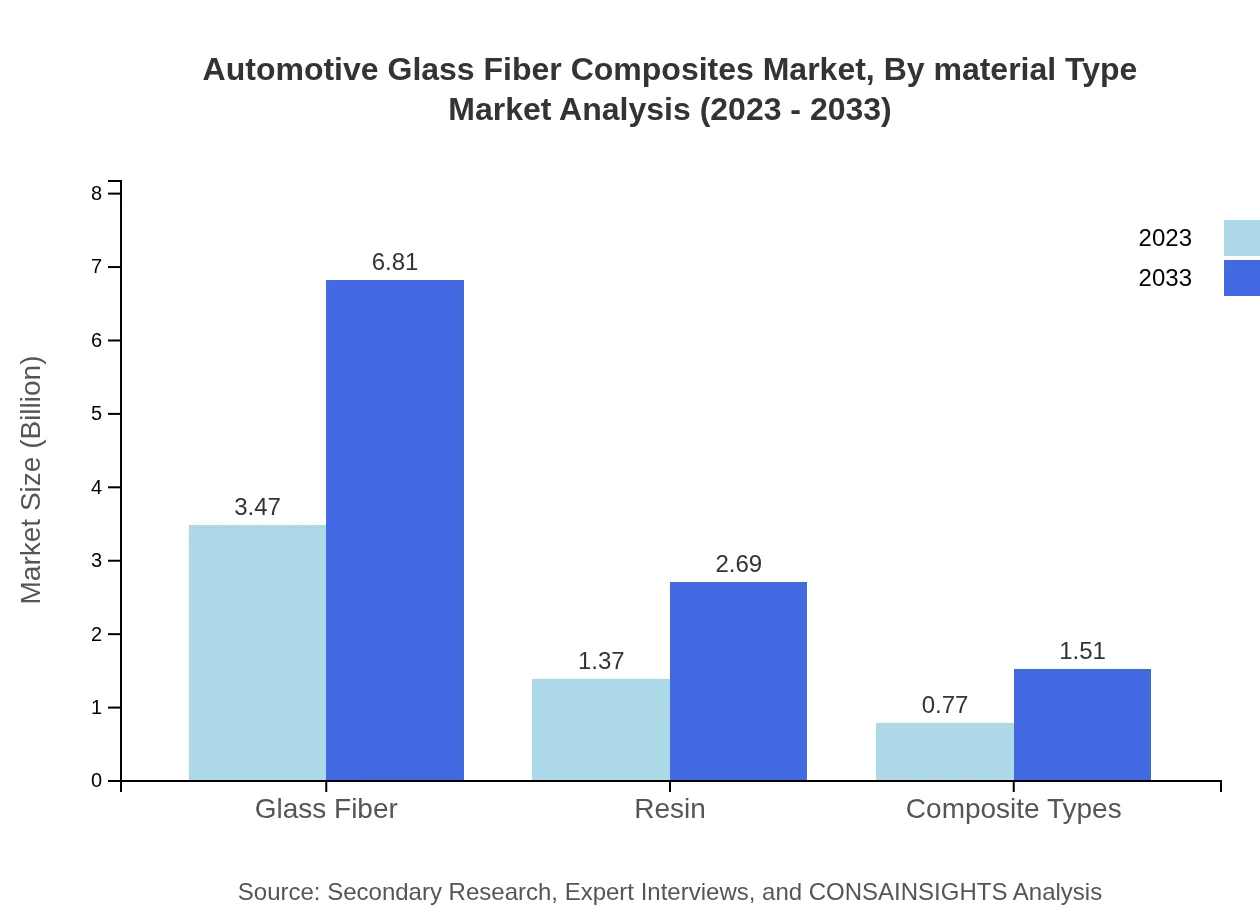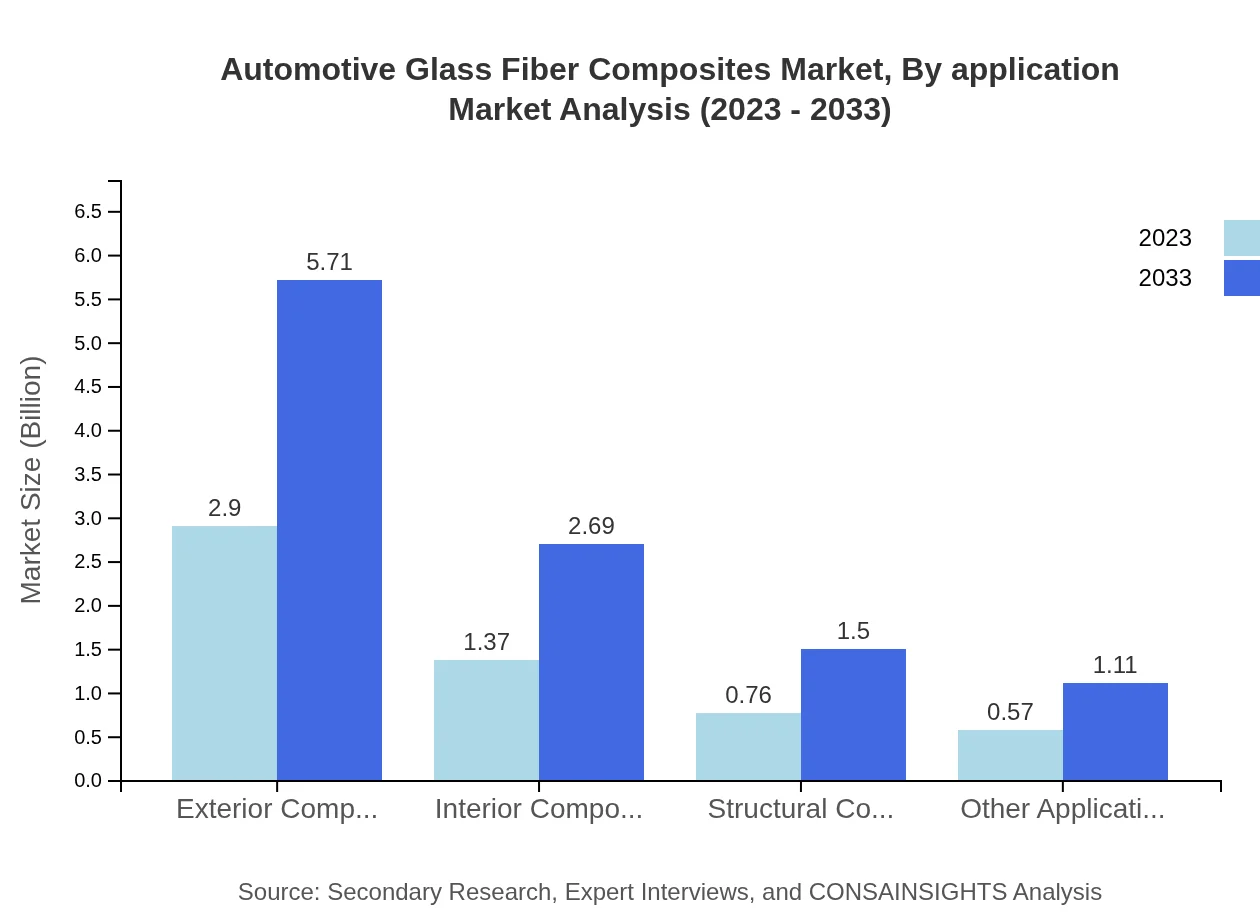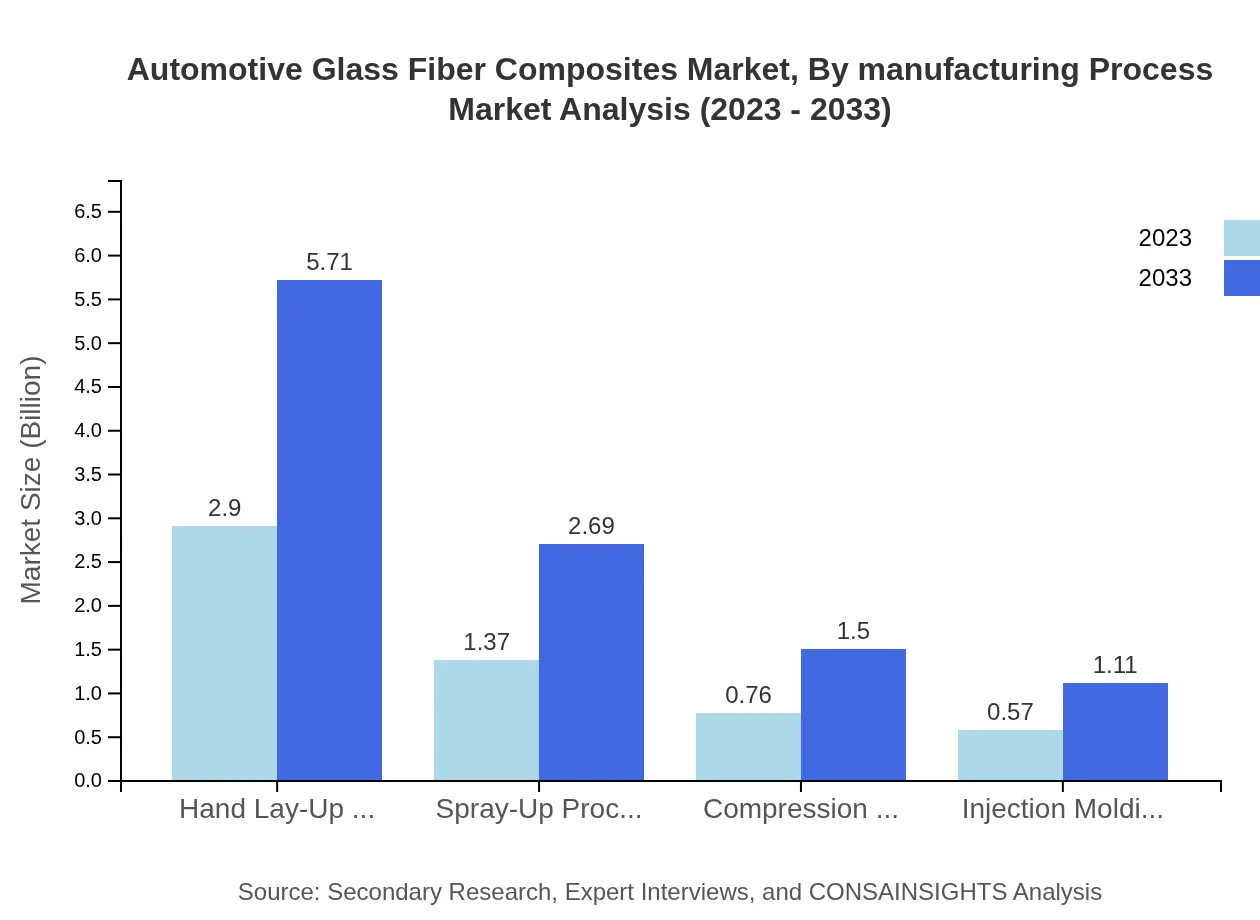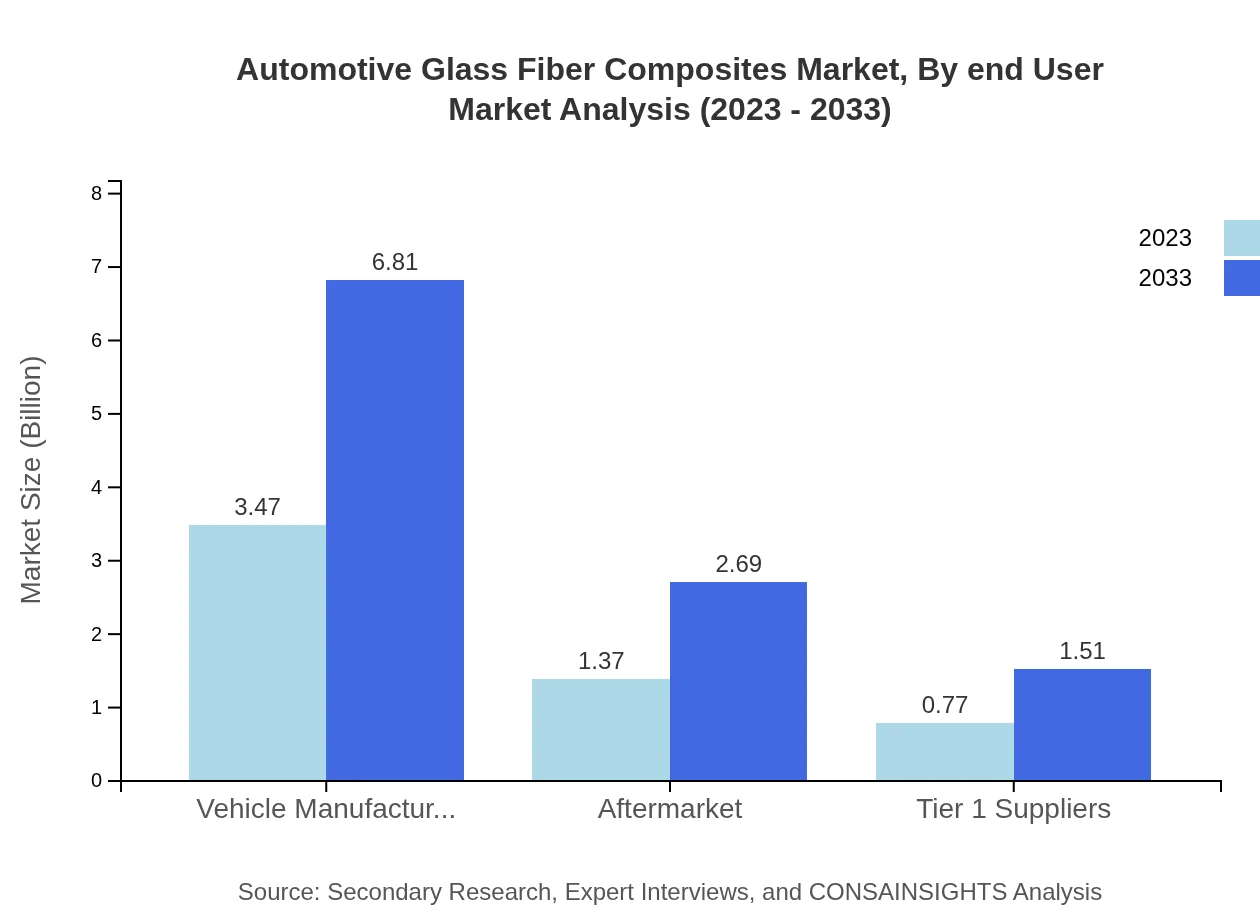Automotive Glass Fiber Composites Market Report
Published Date: 02 February 2026 | Report Code: automotive-glass-fiber-composites
Automotive Glass Fiber Composites Market Size, Share, Industry Trends and Forecast to 2033
This report provides comprehensive insights into the Automotive Glass Fiber Composites market, covering market trends, segmentation, regional analysis, and forecasts from 2023 to 2033.
| Metric | Value |
|---|---|
| Study Period | 2023 - 2033 |
| 2023 Market Size | $5.60 Billion |
| CAGR (2023-2033) | 6.8% |
| 2033 Market Size | $11.01 Billion |
| Top Companies | Toray Industries, Inc., BASF SE, SABIC, 3M, Covestro AG |
| Last Modified Date | 02 February 2026 |
Automotive Glass Fiber Composites Market Overview
Customize Automotive Glass Fiber Composites Market Report market research report
- ✔ Get in-depth analysis of Automotive Glass Fiber Composites market size, growth, and forecasts.
- ✔ Understand Automotive Glass Fiber Composites's regional dynamics and industry-specific trends.
- ✔ Identify potential applications, end-user demand, and growth segments in Automotive Glass Fiber Composites
What is the Market Size & CAGR of Automotive Glass Fiber Composites market in 2023?
Automotive Glass Fiber Composites Industry Analysis
Automotive Glass Fiber Composites Market Segmentation and Scope
Tell us your focus area and get a customized research report.
Automotive Glass Fiber Composites Market Analysis Report by Region
Europe Automotive Glass Fiber Composites Market Report:
Europe is projected to witness steady growth in the Automotive Glass Fiber Composites market, with market size anticipated to increase from $1.37 billion in 2023 to $2.69 billion by 2033, supported by advancements in environmental regulations.Asia Pacific Automotive Glass Fiber Composites Market Report:
The Asia Pacific region is expected to witness rapid growth, with the market size anticipated to reach $2.34 billion by 2033, up from $1.19 billion in 2023. This expansion is primarily driven by increasing automobile production in countries like China and India.North America Automotive Glass Fiber Composites Market Report:
North America held the largest market share in 2023, with a market size of $2.07 billion, expected to expand to $4.07 billion by 2033, driven by stringent regulations and a strong focus on vehicle lightweighting.South America Automotive Glass Fiber Composites Market Report:
In South America, the Automotive Glass Fiber Composites market is projected to grow from $0.55 billion in 2023 to $1.09 billion by 2033, fueled by rising automotive manufacturing activities and demand for innovative materials.Middle East & Africa Automotive Glass Fiber Composites Market Report:
In the Middle East and Africa, the market is expected to rise from $0.42 billion in 2023 to $0.82 billion by 2033, fueled by growing automotive production and strategic investments in the automotive sector.Tell us your focus area and get a customized research report.
Automotive Glass Fiber Composites Market Analysis By Material Type
The material type segment includes Glass Fiber, Resin, and Composite Types. Glass Fiber dominates the market, accounting for approximately $3.47 billion in 2023, projected to reach $6.81 billion by 2033. Resins are also significant, expected to grow from $1.37 billion to $2.69 billion over the forecast period, given their critical role in composite manufacturing.
Automotive Glass Fiber Composites Market Analysis By Application
The application segment is divided into Vehicle Manufacturers and Aftermarket. Vehicle Manufacturers represent the largest share, valued at $3.47 billion in 2023, and expected to increase to $6.81 billion by 2033. The Aftermarket segment, valued at $1.37 billion in 2023, is anticipated to rise to $2.69 billion, driven by vehicle maintenance and parts upgrades.
Automotive Glass Fiber Composites Market Analysis By Manufacturing Process
Key manufacturing processes include Hand Lay-Up Process, Spray-Up Process, Compression Molding, and Injection Molding. The Hand Lay-Up Process holds the largest market share, with a size of $2.90 billion in 2023, projected to grow to $5.71 billion by 2033, given its applicability in large-scale composites. Injection Molding will also see significant growth from $0.57 billion to $1.11 billion during the same period.
Automotive Glass Fiber Composites Market Analysis By End User
End-User analysis includes Passenger Cars and Commercial Vehicles. The passenger car segment is expected to dominate, given the higher adoption of lightweight materials, while the commercial vehicle segment is also growing due to increased demand for efficiency and performance.
Automotive Glass Fiber Composites Market Trends and Future Forecast
Tell us your focus area and get a customized research report.
Global Market Leaders and Top Companies in Automotive Glass Fiber Composites Industry
Toray Industries, Inc.:
A leading manufacturer of advanced composite materials, Toray offers a wide range of glass fiber composites used in automotive applications, focusing on innovation and sustainability.BASF SE:
BASF is a global chemical company that produces high-performance polymers and composite materials, providing strategic solutions to the automotive industry.SABIC:
SABIC specializes in high-performance materials and thermoplastics, playing a key role in the automotive sector with innovative glass fiber composites.3M:
Known for its adhesive and bonding solutions, 3M utilizes glass fiber composites in a range of automotive applications to enhance performance and durability.Covestro AG:
Covestro offers polycarbonate and other polymers, advancing the use of glass fiber composites in automotive manufacturing with a focus on lightweight and design.We're grateful to work with incredible clients.









FAQs
What is the market size of automotive Glass Fiber Composites?
The automotive glass fiber composites market is currently valued at approximately $5.6 billion and is forecasted to grow at a compound annual growth rate (CAGR) of 6.8%, potentially reaching new heights over the next decade.
What are the key market players or companies in this automotive Glass Fiber Composites industry?
Key players in the automotive glass fiber composites market include prominent manufacturers and suppliers focused on developing innovative solutions, contributing to market stability, and fostering growth through strategic partnerships and technological advancements.
What are the primary factors driving the growth in the automotive Glass Fiber Composites industry?
Factors driving the market growth include the increasing demand for lightweight materials in automotive manufacturing, advancements in composite technologies, and heightened consumer awareness regarding fuel efficiency and sustainability practices.
Which region is the fastest Growing in the automotive Glass Fiber Composites?
North America is the fastest-growing region in the automotive glass fiber composites market, projected to increase from $2.07 billion in 2023 to $4.07 billion by 2033, driven by a strong automotive industry and expanding manufacturing capabilities.
Does ConsaInsights provide customized market report data for the automotive Glass Fiber Composites industry?
Yes, ConsaInsights offers customized market report data tailored to the specific needs and requirements of clients in the automotive glass fiber composites industry, including detailed analysis and forecasts.
What deliverables can I expect from this automotive Glass Fiber Composites market research project?
Deliverables typically include comprehensive market reports, trend analysis, regional assessments, competitive landscape evaluations, and actionable insights that assist clients in strategic decision-making.
What are the market trends of automotive Glass Fiber Composites?
Current trends in the automotive glass fiber composites market include a shift towards eco-friendly materials, increasing application in automotive interiors and exteriors, and rising investments in research and development to enhance product performance.

